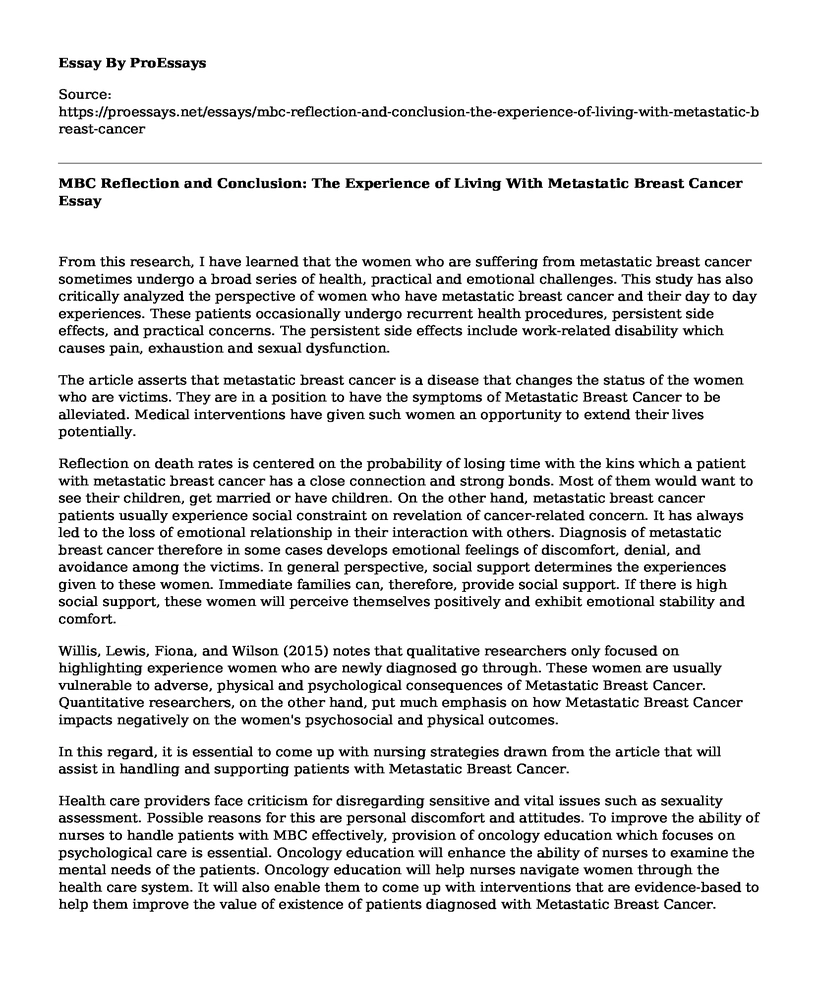From this research, I have learned that the women who are suffering from metastatic breast cancer sometimes undergo a broad series of health, practical and emotional challenges. This study has also critically analyzed the perspective of women who have metastatic breast cancer and their day to day experiences. These patients occasionally undergo recurrent health procedures, persistent side effects, and practical concerns. The persistent side effects include work-related disability which causes pain, exhaustion and sexual dysfunction.
The article asserts that metastatic breast cancer is a disease that changes the status of the women who are victims. They are in a position to have the symptoms of Metastatic Breast Cancer to be alleviated. Medical interventions have given such women an opportunity to extend their lives potentially.
Reflection on death rates is centered on the probability of losing time with the kins which a patient with metastatic breast cancer has a close connection and strong bonds. Most of them would want to see their children, get married or have children. On the other hand, metastatic breast cancer patients usually experience social constraint on revelation of cancer-related concern. It has always led to the loss of emotional relationship in their interaction with others. Diagnosis of metastatic breast cancer therefore in some cases develops emotional feelings of discomfort, denial, and avoidance among the victims. In general perspective, social support determines the experiences given to these women. Immediate families can, therefore, provide social support. If there is high social support, these women will perceive themselves positively and exhibit emotional stability and comfort.
Willis, Lewis, Fiona, and Wilson (2015) notes that qualitative researchers only focused on highlighting experience women who are newly diagnosed go through. These women are usually vulnerable to adverse, physical and psychological consequences of Metastatic Breast Cancer. Quantitative researchers, on the other hand, put much emphasis on how Metastatic Breast Cancer impacts negatively on the women's psychosocial and physical outcomes.
In this regard, it is essential to come up with nursing strategies drawn from the article that will assist in handling and supporting patients with Metastatic Breast Cancer.
Health care providers face criticism for disregarding sensitive and vital issues such as sexuality assessment. Possible reasons for this are personal discomfort and attitudes. To improve the ability of nurses to handle patients with MBC effectively, provision of oncology education which focuses on psychological care is essential. Oncology education will enhance the ability of nurses to examine the mental needs of the patients. Oncology education will help nurses navigate women through the health care system. It will also enable them to come up with interventions that are evidence-based to help them improve the value of existence of patients diagnosed with Metastatic Breast Cancer.
Nurses should also actively engage in the assessment of the psychological need of the breast cancer patients. Willis, Lewis, Fiona, and Wilson (2015) notes that inadequate assessment of psychosocial needs has a connection with lack of evidence-based interventions. It has led to lack of adequate information and knowledge concerning the experience that patients with Metastatic Breast Cancer go through. Nurses should, therefore, discuss sexual and health issues because this is an essential aspect of medical care.
Nurses should also communicate effectively with their patients and their families. Effective communication is very critical in the provision of quality and holistic medical care. It helps in understanding meanings and experiences that women living with Metastatic Breast Cancer go through. Nurse navigators help in maintaining communication between the patient and the healthcare team. There is a reduction of chances of anxiety, suicidal tendencies, and depressive symptoms if nurses communicate effectively with these patients. Nurse navigation will help nurses to detect mood changes, concerns, and talk to the rest of the team.
Reference
Willis, K., Lewis, S., Ng, F., & Wilson, L. (2015). The experience of living with metastatic breast cancer-A review of the literature. Health care for women international, 36(5), 514-542.
Cite this page
MBC Reflection and Conclusion: The Experience of Living With Metastatic Breast Cancer. (2022, May 26). Retrieved from https://proessays.net/essays/mbc-reflection-and-conclusion-the-experience-of-living-with-metastatic-breast-cancer
If you are the original author of this essay and no longer wish to have it published on the ProEssays website, please click below to request its removal:
- Paper Example on 50yo African American Case: Diabetes, HTN, Hyperlipidemia
- Essay Sample on Pharma Industry: Stereotypes & Stakeholder Perceptions
- Essay Example on My Journey to Become a Qualified Nurse: A Passionate Student's Story
- Essay on Psychosocial Factors & Patient Education: Impact on Health
- Essay Example on Societal Changes, Healthcare System & Economic Growth: A Look Ahead
- Research Paper on Hourly Rounding: Enhancing Patient Care in Hospitals
- Human Papillomavirus: Cervical Cancer, Genital Warts, Vaccine Options - Essay Sample







